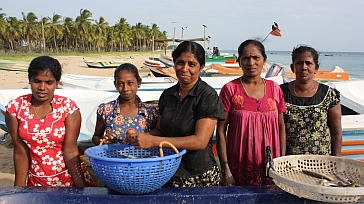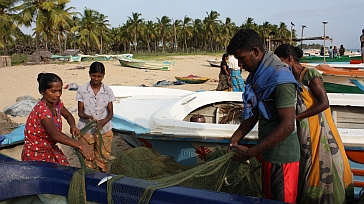Our impact, their stories
Post war resilience: New skills bring better incomes for Sri Lankan women
An ILO and Australian Government project is increasing economic resilience and prosperity in post-war Sri Lanka.

On this day the catch is not large, because of rough weather. But the income is enough to pay her daily expenses. On good days she can make about 3,000 rupees (US$22). And this fishing job brings her more than just an income. More importantly, it means a peaceful and stable life. “I could stay at home and look after my children, not going away to work,” Selvasingam said.
The positive changes in her life have also delighted the project officers at the International Labour Organization (ILO), because she is one of the beneficiaries of the Local Empowerment through Economic Development (LEED) project. Launched in 2010 with support from the Australian Government, LEED aims to help rebuild the livelihoods of the survivors of the 30 year civil war in Sri Lanka, especially households now headed by women.
The Mullaitive District, Selvasingam’s home, saw some of the worst fighting during the civil war. While the family were displaced by the conflict her husband died of cancer, leaving her with four children to support. When the war ended, she came back to find both the family house and their source of income had been destroyed.
Then, the ILO, which was actively engaged in post-war rehabilitation, intervened.
"We believe through the LEED project, we should give proper attention to female-headed households to develop their local economy,” Shanthi Sivanesan, Gender Officer of ILO LEED Project said. “That’s the reason women should take part in the project – to get better income for them.”

“I thank the ILO very much for supporting me,” said Selvasingam. All of her four children are now at university and she hopes they will get government jobs after graduation.
“Some of the key activities we funded under the ILO include the creation of new jobs for women in remote locations, enabling them to work productively without having to travel too far from home,” Robyn Mudie, Australian High Commissioner in Sri Lanka, said. “And this is particularly important for female-headed households where women were trying to juggle the responsibilities of raising children and earning an income.”

Suganthy Mathiseelan is one such woman. She used to run her small tailoring business from home but with the help from the ILO she learned business skills such as budgeting, bookkeeping and business expansion, and was able to build a shop in Mullaitivu Disctrict and provide jobs for six other people. Her monthly net profit is now around 25,000 rupees (US$188).
“I got training from the ILO and I got some loans with lower interest from banks. Then, I bought more machines and employed three more people,” Suganthy said.
With further encouragement from the ILO, she has become a board member of Mullaitivu District Thrift and Credit Cooperative Societies’ Union, which helps people – especially the young – develop their businesses. At a union conference she introduced the ILO training programme and, motivated by her success, more people joined the training and have started successful businesses.
In all 27 women are now on the boards of cooperatives in Sri Lanka’s Northern Province. As well as being economically independent they are eager to help other women and men. “I want to help everyone who has the potential to earn,” Suganthy said. “They should not depend on others. Rather, they should stand on their own feet.”